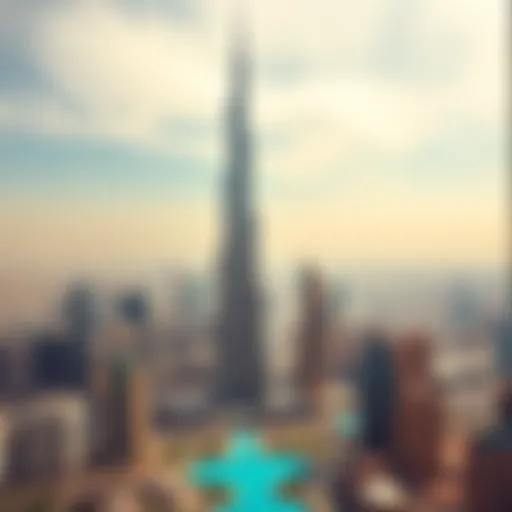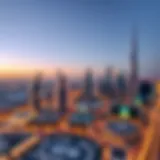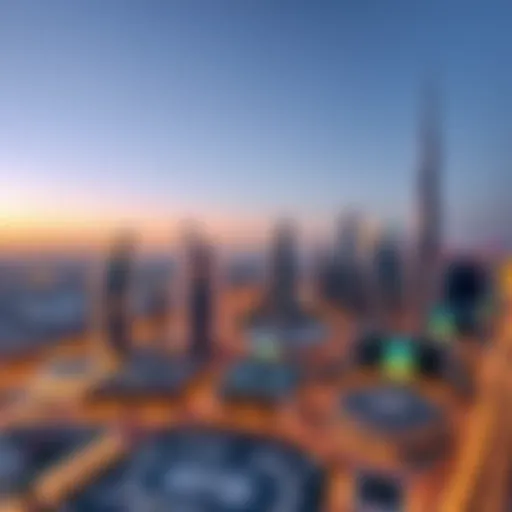Ramadan in Dubai 2024: Timing and Cultural Insights
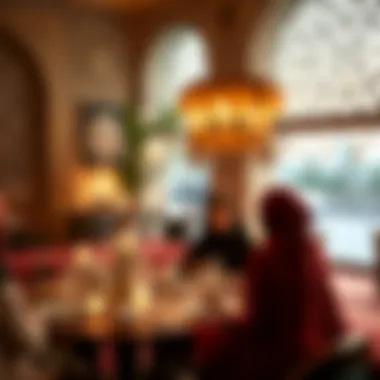

Intro
The holy month of Ramadan holds profound significance for Muslims around the globe, and its observance in Dubai brings unique dynamics, both culturally and economically. As 2024 approaches, it's crucial for various stakeholders, including investors, renters, and real estate agents, to grasp the nuances of Ramadan's timing and its implications on daily life and the housing market.
In Dubai, where the pace of life shifts during this month, understanding the timing of Ramadan is not just a matter of religious observance; it affects businesses, social activities, and housing patterns. The month encourages reflection, fasting, and community gatherings, but also introduces practical considerations for those engaged in real estate. This guide seeks to unveil how Ramadan's timing intersects with market trends, property types, and daily life adjustments, ensuring both cultural appreciation and practical insight for everyone involved in the Dubai property landscape.
As Ramadan begins, typically with the sighting of the crescent moon, this marks a time to adapt behaviors, schedules, and even investment strategies to align with the rhythm of this sacred period. The transition from bustling routines to a more subdued pace calls for awareness from both tenants and property managers, as recent years have shown that Ramadan can significantly influence the real estate sector.
Prepare to dive into the essential aspects of Ramadan in Dubai, as we explore market trends and various property types that can guide informed decisions throughout this unique month.
Overview of Ramadan
Ramadan represents more than just a month on the Islamic calendar; it is a time of reflection, community, and spiritual rejuvenation. As we navigate through the timing and observances of Ramadan in Dubai for 2024, it is imperative to comprehend the layers of significance that this holy month holds for millions. In Dubai, where cultures blend seamlessly, Ramadan takes on unique characteristics that resonate distinctly among its residents and expatriates.
Participants engage in fasting from dawn until sunset, a practice that holds profound implications for both the individual and the community at large. This fast is not merely a physical abstention from food and drink; it embodies a comprehensive ethos of self-discipline, empathy towards the underprivileged, and an opportunity for spiritual growth. Moreover, it sparks a shifting rhythm of daily life that affects work schedules, social interactions, and cultural gatherings.
Key Elements of Ramadan in Dubai
- Spiritual Growth: Fasting during Ramadan is a time for Muslims to strengthen their ties with their faith. Individuals often partake in nightly prayers and reflections to deepen their connection to spirituality.
- Community Engagement: The month fosters a sense of community and belonging, with families and friends coming together for evening meals known as Iftar. In a city like Dubai, which boasts a diverse population, Iftar gatherings often mix cultures, offering a peculiar yet beautiful blend of festivities.
- Changes in Daily Routines: The approach to daily responsibilities alters significantly. Businesses adjust their hours, schools may modify their timings, and social engagements shift to evenings. Understanding these changes is crucial for both residents and newcomers seeking to acclimate swiftly.
- Economic Dynamics: Ramadan also influences the local economy, particularly in sectors such as retail and hospitality. Special offers and events during this month are commonplace, prompting increased consumer activity.
In essence, grasping the nuances of Ramadan helps in appreciating its multifaceted role within Dubai's social fabric. The month provides vital insights into the cultural identity of the region, illuminating practices that might otherwise go unnoticed.
As we move forward, it will be useful to delve into the specifics of when Ramadan starts in 2024 and the factors that might affect its timing.
Inception of Ramadan
In Dubai, Ramadan is not just a month; it’s a cultural phenomenon that shapes many aspects of life. The inception of Ramadan this year is crucial as it sets the tone for spiritual reflection, communal gatherings, and many other elements that affect daily routines and market behaviors.
Understanding when Ramadan begins allows residents and stakeholders alike to plan accordingly. In a city as dynamic as Dubai, knowing the start date is vital for businesses, schools, and communities. It impacts everything from working hours in offices to the scheduling of prayer times and family gatherings. Additionally, for those involved in real estate, the timing can influence buyer activity and rental demands.
The anticipation leading up to the start of Ramadan adds another layer of significance. For many, it is a time for spiritual cleansing and preparation, making the inception critical from both communal and personal viewpoints.
Expected Start Date
Typically, the start date for Ramadan shifts each year, following the lunar calendar. For 2024, Ramadan is expected to commence around the evening of March 10, based on preliminary calculations. The date is subject to change, however, as it depends ultimately on the visual sighting of the moon.
Being aware of this expected timing allows both residents and visitors to navigate their plans. Restaurants and shops might adjust their hours, and community events will be plentiful. Hence, knowing this date is like having a street map in a bustling city.
Factors Affecting the Date
Moon Sighting
The moon sighting tradition plays a pivotal role in determining the start of Ramadan. Unlike a fixed date, it relies on the observation of the crescent moon, which can vary not only by location but also due to weather conditions. In most places, local religious authorities will announce the beginning of Ramadan after the sighting.
This reliance on natural phenomena adds a layer of anticipation each year. For some, it’s a blessing to witness the first sliver of the moon and marks an exciting moment in the community. However, this can lead to discrepancies in dates across different regions, making it a topic of lively discussion within the Muslim community.
"Each year brings the first glimpse of the moon, representing renewal, hope, and community bonding."
Geographical Variations
Geographical variations also influence how Ramadan is observed worldwide, affecting everything from local customs to meal times. In a cosmopolitan city like Dubai, you will find an array of cultural interpretations of Ramadan, enriching its experience.
In places further north, the fasting hours can extend dramatically in summer months, sometimes leading to fasts lasting nearly twenty hours. In Dubai, the duration is more manageable, providing a different experience altogether. This difference highlights why location matters; it affects not just timing but lifestyle and community activities during Ramadan.


Thus, understanding these geographical nuances can enhance planning for both local residents and foreign visitors. Knowledge about the cultural implications of timing can also enrich the community's observance and appreciation of the holy month.
Ramadan Observances in Dubai
Ramadan in Dubai is not just a month of fasting; it’s a vibrant blend of traditions, rituals, and community engagement. The observances during this holy month hold deep significance for both the local residents and expatriates. Understanding these observances is crucial for anyone looking to appreciate how life transforms during this period. It marks a time of reflection, spirituality, and a shift in daily activities that influence how individuals engage with their families, workplaces, and neighborhoods.
Daily Routine Changes
Changes in daily routines during Ramadan reflect the profound impact this month has on individuals and families in Dubai.
Working Hours
During Ramadan, working hours for most businesses in Dubai are adjusted. This change aims to accommodate the fasting schedule of employees, who abstain from food and drink from dawn until sunset. Typically, official working hours are shortened, usually capping at six hours.
This adjustment is a popular move as it shows respect for the observance of fasting. It benefits both employees and employers by allowing workers to maintain productivity while managing the physical strain of fasting. The unique feature of these altered work hours is that businesses often shift their operations to later in the day, venturing into the evening hours when people can break their fast, fostering a more energetic environment. However, this could also mean a squeeze in productivity as employees may feel fatigued during earlier hours.
School Timings
Similar to the workplace, school timings in Dubai also reflect the significance of Ramadan. Schools often adjust their schedules, typically starting later in the morning and finishing earlier in the day. This change is tailored to protect students, considering the added challenges of fasting and in many cases, the heat during the day.
The adjusted school hours allow children to study effectively while participating in Ramadan’s spiritual and social activities. This setup is beneficial, promoting a balanced approach to education and observance. Nonetheless, it can sometimes create a bit of chaos for parents trying to synchronize their work hours with their children’s modified schedules.
Cultural Events
Cultural events during Ramadan in Dubai resonate with community spirit as individuals come together to celebrate shared values and customs.
Iftar Gatherings
Iftar gatherings are emblematic of community bonding during Ramadan. These meals to break the fast typically occur at sunset, where friends, families, and neighbors come together. In Dubai, you’ll see an array of options to enjoy these gatherings, from lavish hotel buffets to quaint home-cooked meals.
Iftar is not just about food; it’s about connection and sharing. It promotes an atmosphere of generosity and hospitality, which in itself is a key highlight of Ramadan. The challenge, however, can be the logistics involved in hosting and attending large gatherings, especially for expatriates or newcomers who may feel overwhelmed by the cultural nuances.
Charitable Activities
Charitable activities flourish during Ramadan, emphasized by the concept of Zakat, a form of voluntary charity many choose to observe during this month. In Dubai, organizations and individuals engage in various charitable efforts, from food drives to community outreach programs.
This practice not only helps those in need but also reinforces a sense of togetherness within the community. The major benefit is that it cultivates awareness of those less fortunate, bridging gaps between different social strata. However, the sheer number of initiatives can sometimes make it difficult for individuals to choose where to contribute, leading to decision fatigue among potential donors.
Engaging in cultural events and routines can enhance the Ramadan experience for expats and locals alike, creating a tapestry of interactions that exemplify the season's essence.
In summary, during Ramadan, daily life in Dubai evolves significantly, characterized by modified routines and an enriched cultural atmosphere. Understanding these observances allows both residents and visitors to engage meaningfully with the community while honoring its traditions.
Real Estate Implications
Understanding real estate implications during Ramadan is essential for those involved in the property market in Dubai. The holy month brings specific changes in market behavior, influencing both buyers and renters in distinct ways. It’s vital to grasp how Ramadan affects the market dynamics, considering it can lead to unique opportunities as well as challenges.
Market Trends During Ramadan
Buyer Activity
During Ramadan, buyer activity in the Dubai real estate market often undergoes a transformation. Historically, prospective buyers tend to be more contemplative during this time, engaging in meticulous research rather than impulsive decisions. This pattern can be attributed to the spiritual and reflective nature of Ramadan, leading many individuals to consider their investments more carefully.
In terms of buyer characteristics, there is usually an uptick in inquiries as people look to make significant purchases pre-Eid, capitalizing on favorable trends in the market. Buyers may view this period as beneficial due to lower competition; many investors often hold back, waiting until after Eid to make moves, giving those who are actively searching some breathing room.
However, it’s crucial to be mindful of the challenges that accompany Ramadan as well. Limited availability of properties and reduced negotiation flexibility may arise as many sellers also take time off, complicating transactions.
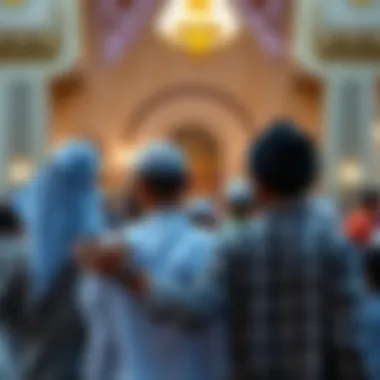

Rental Demand
Rental demand in Dubai tends to experience a noticeable shift during Ramadan. Many expatriates and locals find themselves seeking temporary accommodations, often gravitating towards furnished apartments that cater to short stays. This trend is partly driven by the influx of family and friends visiting the city during the festive periods surrounding Ramadan and Eid al-Fitr.
What makes rental demand compelling during this month is the variety of unique offerings that landlords present, often aiming to attract tenants looking for community-based experiences. Many property owners enhance their listings to highlight proximity to mosques and family-friendly amenities.
Nevertheless, the rental market can be tricky, as property owners must balance between maintaining reasonable prices while catering to the surge in demand. This fluctuation can also lead to inflated rental prices in popular neighborhoods close to community hubs and mosques.
Investment Opportunities
Emerging Neighborhoods
Emerging neighborhoods in Dubai are a hot topic, particularly during Ramadan as investors often look for undervalued properties. The period provides a great chance for individuals interested in long-term investments, especially in areas that might be overlooked but show signs of growth.
One salient feature of these neighborhoods is the increasing availability of facilities that cater directly to family needs, such as schools, healthcare, and recreational areas. This is a significant draw for those looking to settle in burgeoning communities, providing potential buyers good reason to invest.
However, caution is advised because while opportunities abound, some emerging areas may not yet offer the infrastructure or amenities that attract immediate resales or rentals. Hence, thorough research and market insight are key.
Commercial Developments
Commercial developments can also be a focus during Ramadan, especially for business owners looking to capitalize on the festive spirit. With more people partaking in Iftar gatherings and community activities, establishments nearby receive heightened foot traffic, making them lucrative targets for investors.
The commercial real estate market can be particularly advantageous since Ramadan brings an increase in consumer spending and seasonal retail opportunities. Businesses that provide proper festive offerings can really thrive during this period.
That being said, new investors should remain aware of potential risks including heightened competition for leases, which can result in increased rental costs for prime spaces. On top of that, the fluctuations in consumer behavior during and post-Ramadan could influence economic performance throughout the year.
The impact of Ramadan on Dubai's real estate market is multi-dimensional, influencing both buyers and renters uniquely while presenting distinct opportunities for investment.
Living and Renting During Ramadan
Living and renting during Ramadan in Dubai presents a unique tapestry of experiences and challenges. As this holy month approaches, both residents and newcomers must adapt to changes in routine and local customs. Understanding these elements can significantly enhance the quality of life during a period that is culturally rich and spiritually profound. For prospective renters or investors, knowing what to expect can lead to better decisions in the real estate landscape.
Adjusting to Local Norms
Dining Considerations
Dining during Ramadan is quite different compared to other months. The act of fasting from dawn to dusk alters not just personal routines but also affects how restaurants and cafes operate. Many eateries remain closed during daylight hours, making it crucial for those living in Dubai to plan meals accordingly.
A key characteristic of dining considerations during Ramadan is the prevalence of iftar meals. After a day of fasting, it's common for families and friends to gather to break their fast together.
This social element offers a beneficial opportunity for community bonding. Many establishments serve special iftar menus, showcasing local delicacies that are crafted to celebrate this holy heritage. However, an important point to note is that dining options might be limited until sunset. Therefore, residents should be mindful of their dining plans, which can be both a disadvantage and an invitation to explore new culinary experiences.
Community Engagement
Community engagement during Ramadan is particularly vibrant in Dubai. Participation in local traditions and events fosters a sense of belonging and mutual respect. During this month, volunteering in charity events is a significant part of community engagement, providing valuable social support.
A notable feature is the countless community iftars organized across the city, where residents can mingle with their neighbors and learn more about local customs. Such gatherings are not only celebratory but also educational, building bridges between cultures. One disadvantage may include the potential for overwhelming schedules, especially for new residents trying to fit in. Therefore, managing time effectively can help in reaping the full benefits of community interaction.
Tips for Foreign Residents
Understanding Etiquette
Understanding etiquette in Dubai during Ramadan is crucial for foreign residents. It involves familiarizing oneself with cultural norms that are particularly pronounced in this holy month. Respecting the tradition of fasting serves not only as an acknowledgment of local customs but also as an expression of goodwill.
One of the key characteristics of this etiquette is dressing modestly and refraining from eating or drinking in public until sunset. For those who may be new to these practices, it can feel daunting, but it is also a rewarding art in showing respect for a culture deeply rooted in its values. Ignoring these norms can have social repercussions and may lead to misunderstandings.
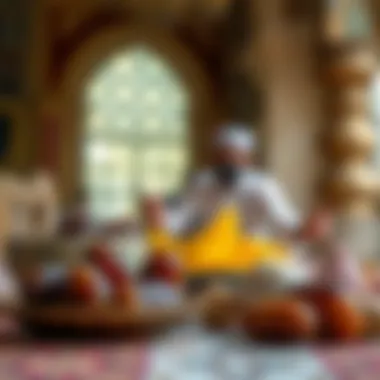

Participating in Events
Participating in events during Ramadan, such as public iftars or charity drives, is an enriching experience for foreigners. It allows for a deeper understanding of the local community while also celebrating the festive spirit of the month. Events are often widely advertised and can be found in local community centers, mosques, and through social media platforms.
A crucial point is that joining these gatherings not only enhances one's experience but can also lead to lasting friendships. However, it is important to approach these interactions with humility and an open heart. Engagement in events can promote a richer understanding of Dubai’s diverse culture and traditions, a definite added value to the residency experience.
End of Ramadan: Eid al-Fitr
Eid al-Fitr marks the conclusion of Ramadan, encapsulating its spiritual essence while celebrating community, family, and gratitude. This day is not merely a formality but a profound expression of faith and cultural identity within the Islamic community. In Dubai, Eid transitions from a time of fasting to one filled with feasting, joy, and sharing. It signifies a renewal of social bonds and a festive atmosphere that enhances the city’s vibrant culture.
Celebrations and Traditions
The fervor of Eid al-Fitr can be felt across the bustling streets of Dubai, a city known for its rich blend of tradition and modernity. One can spot grand festivities that light up neighborhoods with mesmerizing decorations, where families gather to mark the end of a month-long spiritual journey. People indulge in various sweets and dishes unique to this occasion, such as maamoul (filled pastries) and knafeh (a popular dessert), each carrying its distinct flavors and meanings.
Celebrations commence with the Salat al-Eid, a special morning prayer, often performed in large congregational spaces. The spirit of giving is prevalent, as Muslims are encouraged to offer Zakat al-Fitr—charitable donations. This practice not only fulfills a religious obligation but also ensures that those in need can partake in the festive meals that follow.
"Eid al-Fitr is not just a celebration; it’s a moment where faith meets gratitude and communities come together."
Throughout the day, families exchange gifts and visit one another, enhancing communal ties. Events like fairs and markets pop up, providing platforms for exhibitions and sales, showcasing local art and crafts. It’s a time where diversity shines, as you can see individuals from various cultural backgrounds participating in these traditions, solidifying the fabric of Dubai’s multicultural society.
Economic Impact
Retail Boom
The retail landscape in Dubai experiences a distinct transformation during Eid al-Fitr. Shops become vibrant with decorations, promotional sales, and exclusive Eid collections. Retailers emphasize on attire, gifts, and gourmet food, directly tapping into the festive spirit of shoppers. This period witnesses a notable surge in sales, often leading to double-digit growth compared to regular months.
The atmosphere invites various consumer segments; from the affluent purchasing luxuries to families seeking budget-friendly options. Malls like The Dubai Mall capitalize on this by offering extended hours and special events featuring entertainment to draw crowds. The unique feature of Eid sales is the themed offerings that resonate with the local culture, enhancing consumer experience and driving traffic to physical stores as well as e-commerce platforms.
Travel Dynamics
Eid also generates a notable increase in travel within and to Dubai. Residents take this time to embark on domestic trips or travel abroad, contributing to the tourism sector's resurgence following Ramadan. Hotels, tourist attractions, and dining establishments often emphasize Eid celebrations, generating innovative packages that appeal to both residents and visitors.
Local airlines report a spike in bookngs as families travel to be together for the celebrations. This unique feature—an annual rush—presents a blend of limited-time offers and custom deals, catering to both the local and international audience. However, those planning to navigate through this energetic period must consider potential challenges like traffic congestion and fully booked accommodations.
In summary, the transition from fasting to feasting during Eid al-Fitr in Dubai manifests itself not only in spiritual terms but also economically. Emphasizing its significance in community bonding and commercial activities, the observance of this festival reaffirms the interconnectedness of culture and economy, providing clear insights for investors, home buyers, and real estate agents alike.
Concluding Thoughts on Ramadan in Dubai
Ramadan stands as a pivotal moment for the community in Dubai, intertwining deeply with its cultural and economic dynamics. This section draws together key insights from the previous discussions, positioning Ramadan as more than just a religious observance but also a period that unites diverse populations through shared experiences and unique practices.
A significant aspect to consider is how Ramadan shapes the communal fabric of Dubai. It provides a framework where people come together, whether in mosques, community halls, or through informal Iftar gatherings at homes. These interactions foster a sense of belonging, encouraging cultural exchanges and enhancing the spirit of camaraderie amongst residents and visitors alike.
Reflecting on the changes in daily life during this period, it’s clear that adjustments to routines can present both challenges and opportunities. For businesses, the months leading up to and during Ramadan become crucial in understanding consumer behavior, adapting to altered shopping patterns and allowing staff to observe traditional practices. This presents an opportunity for real estate investors and property managers to tap into the market during this season, ensuring properties are aligned with the needs of both long-term residents and transient populations.
In essence, Ramadan is not only a time for individual reflection but also for broader societal introspection about shared values, community spirit, and the importance of understanding different cultural contexts as part of the daily business landscape in Dubai.
Reflection on Community
Community stands as the heartbeat of Ramadan in Dubai. As this holy month approaches, anticipation builds, blending spiritual preparation with social gatherings. Residents often reflect on their roles within their community. The traditional customs of Iftar, when Muslims break their fast together at sunset, become symbols of unity, regardless of age or background.
In Dubai’s vibrant landscape, Ramadan is a time that showcases the rich tapestry of cultures coexisting harmoniously. For foreign residents, this experience can be enlightening, giving them a glimpse into the local way of life and enhancing their understanding of Muslim practices. Engaging in these communal activities can strengthen bonds and foster respect among diverse groups.
This period also encourages charitable activities, with many people and businesses stepping up to support local initiatives to feed the less fortunate. This sense of giving not only helps those in need but also ingrains a valuable lesson about compassion and social responsibility in the younger generation.
Future of Ramadan Practices
Looking ahead, the future of Ramadan practices in Dubai is likely to evolve, shaped by technology and changing socio-economic dynamics. As digital connectivity increases, the manner in which people engage with Ramadan could undergo significant transformations. From virtual Iftar gatherings to online charitable campaigns, technology has the potential to bridge gaps and connect individuals in meaningful ways.
Additionally, with more attention being paid to sustainability, there may be an increasing emphasis on eco-friendly practices during Ramadan. Community initiatives promoting waste reduction during Iftar or encouraging the use of reusable items could become standards rather than exceptions.
Moreover, as the real estate market continues to adapt to socio-cultural changes, there are possibilities for creative uses of space that cater to Ramadan. For instance, outdoor communal areas could be designed specifically for Ramadan festivities, allowing people to gather and share their experiences.



